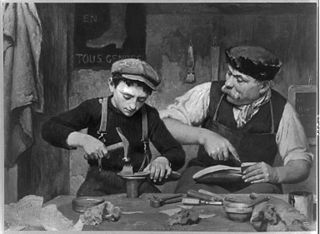Related Research Articles

Apprenticeship is a system for training a new generation of practitioners of a trade or profession with on-the-job training and often some accompanying study. Apprenticeships can also enable practitioners to gain a license to practice in a regulated occupation. Most of their training is done while working for an employer who helps the apprentices learn their trade or profession, in exchange for their continued labor for an agreed period after they have achieved measurable competencies.
Further education in the United Kingdom and Ireland is additional education to that received at secondary school that is distinct from the higher education (HE) offered in universities and other academic institutions. It may be at any level in compulsory secondary education, from entry to higher level qualifications such as awards, certificates, diplomas and other vocational, competency-based qualifications through awarding organisations including City and Guilds, Edexcel (BTEC) and OCR. FE colleges may also offer HE qualifications such as HNC, HND, foundation degree or PGCE. The colleges are also a large service provider for apprenticeships where most of the training takes place at the apprentices' workplace, supplemented with day release into college.

Construction is a general term meaning the art and science to form objects, systems, or organizations, and comes from Latin constructio and Old French construction. To construct is the verb: the act of building, and the noun is construction: how something is built, the nature of its structure.
Education in England is overseen by the United Kingdom's Department for Education. Local government authorities are responsible for implementing policy for public education and state-funded schools at a local level.
Education in the United Kingdom is a devolved matter with each of the countries of the United Kingdom having separate systems under separate governments. The UK Government is responsible for England, whilst the Scottish Government, the Welsh Government and the Northern Ireland Executive are responsible for Scotland, Wales and Northern Ireland, respectively.

The Learning and Skills Council (LSC) was a non-departmental public body jointly sponsored by the Department for Business, Innovation and Skills (BIS) and the Department for Children, Schools and Families (DCSF) in England. It closed on 31 March 2010 and was replaced by the Skills Funding Agency and the Young People's Learning Agency.
Barnfield College is the largest further education college in Bedfordshire, England, with two campuses in Luton.

Government procurement or public procurement is the procurement of goods, services and works on behalf of a public authority, such as a government agency. Amounting to 12 percent of global GDP in 2018, government procurement accounts for a substantial part of the global economy.

The Skills Funding Agency was one of two successor organisations that emerged from the closure in 2010 of the Learning and Skills Council. The agency was in turn replaced by the Education and Skills Funding Agency in 2017.

The Department for Education (DfE) is a department of His Majesty's Government responsible for child protection, child services, education, apprenticeships, and wider skills in England.
SirPeter Birkett is a British educator and entrepreneur, currently known for being the Chief Executive of an educational consultancy company p5e and the Founder and Director of Highgate Hill House School in Devon. Peter Birkett was Knighted in the 2012 Birthday Honours for services to further education and the academy movement
The UK Register of Learning Providers (UKRLP) is a website at https://www.ukrlp.co.uk/ which collects and disseminates information about learning providers in the United Kingdom. Registration with the site allows a school, college or other training organisation to share and update its information with organisations such as the Higher Education Funding Council for England, the Higher Education Statistics Agency, and the Skills Funding Agency. Information on the site can also be accessed by members of the public. The registry was created on 1 August 2005, and lists over 30,000 learning providers. Registration is free.

The Apprenticeship Levy is a UK tax on employers which is used to fund apprenticeship training.
UK Research and Innovation (UKRI) is a non-departmental public body of the Government of the United Kingdom that directs research and innovation funding, funded through the science budget of the Department for Science, Innovation and Technology.
The European Research Executive Agency is a funding body mandated by the European Commission to support the EU Research and Innovation policy. It has been established by the European Commission, based on Council Regulation (EC) No 58/2003.
T Levels are technical-based qualifications in England, developed in collaboration with employers and businesses, with content that meets the needs of industry and prepares students for work, further training, or study.

The Directorate-General for Defence Industry and Space is a department of the European Commission.
Apprenticeships have a long tradition in the United Kingdom, dating back to around the 12th century. They flourished in the 14th century and were expanded during the industrial revolution. In modern times, apprenticeships were formalised in 1964 by act of parliament and they continue to be in widespread use to this day.
At around £290 billion every year, public sector procurement accounts for around a third of all public expenditure in the UK. EU-based laws continue to apply to government procurement: procurement is governed by the Public Contracts Regulations 2015, Part 3 of the Small Business, Enterprise and Employment Act 2015, and the Public Contracts (Scotland) Regulations of 2015 and 2016. These regulations implement EU law, which applied in the UK prior to Brexit, and also contain rules known as the "Lord Young Rules" promoting access for small and medium enterprise (SMEs) to public sector contracts, based on Lord Young's Review Growing Your Business, published in 2013.
The Institute for Apprenticeships and Technical Education (IfATE) is an employer led organisation that supports technical education and apprenticeships in the United Kingdom, through qualifications such as T Levels. It is funded by the Department for Education of the Government of the United Kingdom.
References
- ↑ "New agency to provide joined-up education and skills funding". GOV.UK. Department for Education. 28 March 2017. Retrieved 9 January 2021.
- ↑ "The creation of the Education Funding Agency". Department for Education.
- ↑ DeNové LLP, Project Compass CIC and the National Federation of Builders Ltd., Education Funding Agency Procurement Issues, published March 2015, accessed 20 June 2023
- ↑ "ESFA business plan for 2019 to 2020 financial year" (PDF). GOV.UK. June 2019. pp. 3, 22. Retrieved 9 January 2021.
- ↑ Education and Skills Funding Agency, About us, accessed 20 June 2023
- ↑ Murray, Catherine (18 June 2018). "Profile: Eileen Milner". FE Week. Archived from the original on 20 October 2020.
- ↑ "Eileen Milner". GOV.UK. Retrieved 9 January 2021.